How to be a doctor abroad: Take an international sabbatical
April 14, 2025
Taking an international sabbatical as a physician can be a transformative experience—allowing you to refresh your career, experience new healthcare systems, and make a meaningful impact in global communities. Whether you're looking for a short-term locum tenens assignment or considering a longer stay, there are many paths to work as a doctor abroad.
Here’s a guide to making it happen.
Ask yourself why you want to work abroad
Before taking the leap, ask yourself what you hope to gain from an international sabbatical. Are you looking for adventure, professional growth, or a change of pace? Understanding your motivations will help you choose the right opportunity.
For Dr. Dalilah Restrepo, an infectious disease specialist, taking a break from private practice in New York was meant to be temporary, but it turned into something much more.
“I thought, ‘I'll just do it, just for the heck of it,’” Dr. Restrepo says about her move to New Zealand. “I never expected it to turn into everything it did.” She planned to stay for just a year, but the lifestyle and career opportunities were too good to leave, so she made it home.
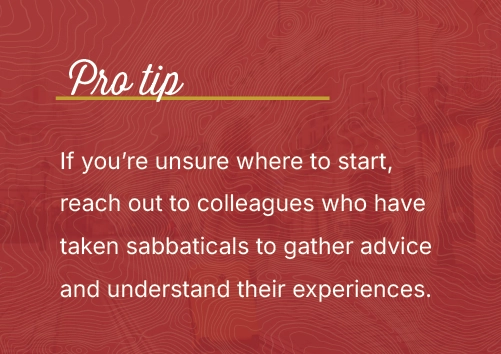
Pro tip: If you’re unsure where to start, reach out to colleagues who have taken sabbaticals to gather advice and understand their experiences. Speaking with peers who’ve navigated international assignments can provide valuable insights and help you anticipate challenges.
Explore international medical opportunities
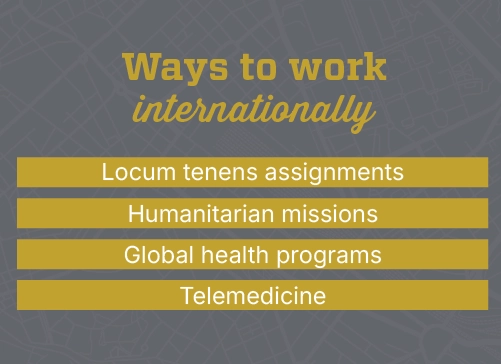
There are various ways to practice medicine abroad:
Locum tenens assignments: Temporary placements allow you to work in different countries for short-term or extended periods.
Humanitarian missions: Organizations like the International Medical Corps offer medical aid in crisis-affected regions.
Global health programs: The CDC and other global health organizations offer positions for physicians interested in public health.
Telemedicine: Advancements in technology now allow some U.S. physicians to practice telemedicine remotely while living abroad.
Dr. John Gallehr, a child and adolescent psychiatrist, first learned about international locums during his residency, but it wasn’t until years later that he took his first assignment.
“We always come up with reasons why we could put it off and do it another time, but it’s just a wonderful thing to do here and now instead of waiting until later,” he shares.
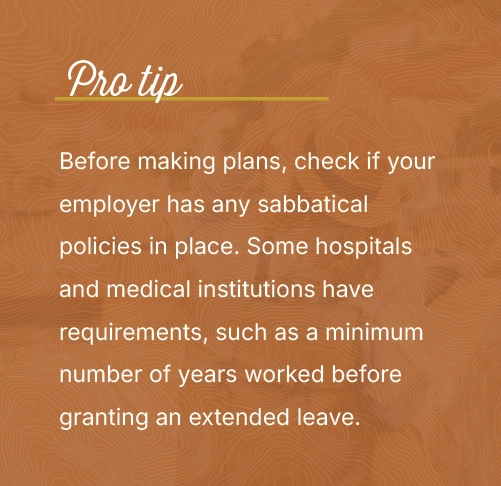
Pro tip: Before making plans, check if your employer has any sabbatical policies in place. Some hospitals and medical institutions have requirements, such as a minimum number of years worked, before granting an extended leave. Consulting your employee handbook or HR department can clarify your options.
Do your research on working as a physician abroad
Global Medical Staffing will take care of your licensing and credentialing, but it may be helpful to research your chosen country's licensing and credentialing process. Some nations require additional exams, while others have streamlined pathways for U.S.-trained doctors. Visa requirements also vary; some countries offer specific medical work visas, while others require sponsorship from an employer or locum agency. Starting this process early will help ensure a smooth transition. Global Medical Staffing will help you and your family secure a visa for the country in which you'll be practicing.
Navigating the paperwork for international work can feel daunting, but having the right support makes a difference.
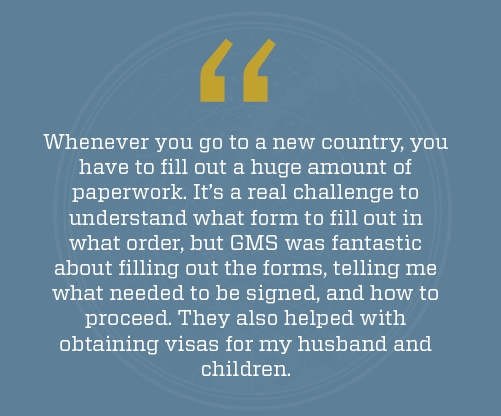
“Whenever you go to a new country, you have to fill out a huge amount of paperwork,” says Dr. Gallehr. “It’s a real challenge to understand what form to fill out in what order, but Global Medical Staffing was fantastic about filling out the forms, telling me what needed to be signed, and how to proceed. They also helped with obtaining visas for my husband and children.”
Additionally, compensation for international locum tenens physicians differs widely depending on the country, specialty, and contract terms. While pay rates in some locations may be lower than in the U.S., benefits—like paid housing, travel stipends, and malpractice coverage—can offset the difference. Make sure to evaluate the total compensation package and compare it to the cost of living in your destination to make an informed decision.
How much can you make? How much locum tenens physicians get paid in other countries
Plan financially to work abroad
Taking time away from your permanent job can impact your income, so plan accordingly:
Savings: Ensure you have enough financial cushion for living expenses and travel costs.
Insurance: Secure health and travel insurance to cover unexpected medical needs abroad.
Retirement contributions: Consider how your sabbatical will affect your long-term financial plans.
Taxes: You may still owe U.S. taxes on foreign income, but the IRS’ foreign earned income exclusion could help reduce your taxable income. Some countries may also tax your earnings, so consult a tax professional to avoid surprises.
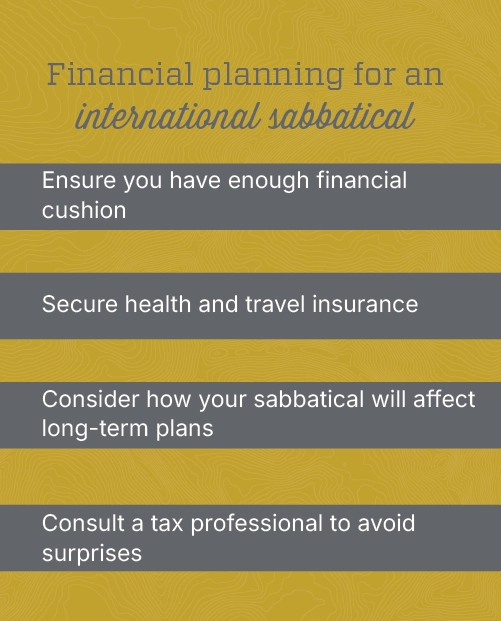
Consider cultural and work-life differences in other countries
Every country has unique cultural expectations and healthcare systems. Understanding these differences can enhance your experience and help you integrate more effectively.
For example, Dr. Gallehr found that New Zealand’s healthcare system provided a refreshing change.
“New Zealand has socialized medicine, so there aren't the insurance companies that we deal with in the U.S.,” he shares. “The patient population is very easy to work with and has health issues similar to those in the U.S.—the same cardiology, neurology, and psychiatry problems. The nurses and doctors are very supportive and help you understand the cultural differences. New Zealand also has cultural advisors, especially with the Maori population or some of the Pacific Island populations.”
Prepare for re-entry
Discuss your sabbatical with your employer beforehand if you plan to return to your permanent job. Some hospitals may offer flexible arrangements or hold your position while you’re away.
Dr. Rachael Consoli has taken multiple sabbaticals from her job in Boston.
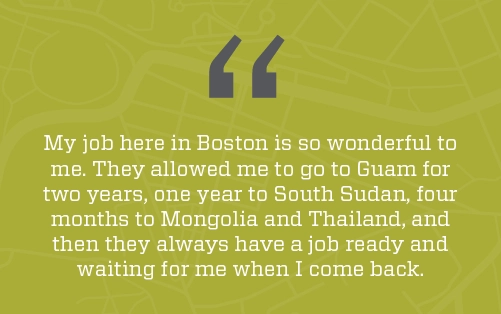
“My job here in Boston is so wonderful to me. They allowed me to go to Guam for two years, one year to South Sudan, four months to Mongolia and Thailand, and then they always have a job ready and waiting for me when I come back,” she says. “They understand that I enjoy doing this kind of travel. They also understand when I come back, I give them 100% and work anything and everything they want me to or that I want to.”
Curious about medical missions? Read these 6 expert tips for having a successful medical mission
Take the leap to work as a doctor abroad
If you’ve ever thought about working abroad, don’t wait for the perfect time; there may never be one.
“Do it. You won’t regret it,” says Dr. Restrepo. “The learning curve is huge. Everything is a whole new adventure.”
Interested in learning more about international locum tenens opportunities for physicians? Give us a call at 855.407.6961 or view today’s international job opportunities.

